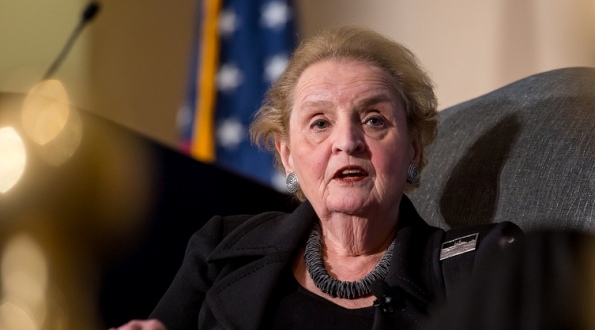BECOME A MEMBER
>JOIN
Madeleine Albright Shares Her Vision on Diplomacy and Democracy

In a conversation with Dr. Robin Niblett, Director of Chatham House, on Friday April 19, 2013, former US Secretary of State Madeleine Albright shared her insights into the relevance of diplomacy and its impact upon a state's power abroad.
“Americans do have a tendency, I think, to make lists and check them off and see that they are done. Yet I have found that things never really are quite done, that they need to continue to be managed in a variety of ways”, she said and added that “while we do like to check off lists, I think that we also understand the value of talking. The thing that’s hard […] is that part of it is that diplomatic activities are always covered and the question is: what did you just accomplish? What came out of this meeting? And if there’s not a specific result then people say diplomacy failed.”
In light of the 10 year anniversary of the Iraq invasion and the ongoing transitions in the Middle East, Madeleine Albright shared her vision on democracy and its role in foreign relations and diplomacy. When trying to define democracy, “we’re so focused on elections that we’ve forgotten about governance, which is: why is it that people are elected – what is it they’re supposed to do? […] I think basically people everywhere want to be able to make decisions about their own lives. […]” She also emphasized that democracy “[is] not an event, it’s a process”, and added: “[b]elieve it or not, we’re still working on it in the US.”
With regard to the question “what comes first, political development or economic development” Madeleine Albright explained that “[t]hey clearly go together. […] democracy has to deliver, because people want to vote and eat. So the bottom line is: how does the democratically elected government basically create and distribute wealth?”
Confronted with the question where she saw political Islam fitting in the arc of a shift to more representative government, or the process in the Middle East she referred to the research she had done for a book about the role of god and religion in foreign policy and she concluded: “So I do not see a contradiction between Islam and democracy. […] But there are other things going on within the Muslim religion – and then we have a tendency to kind of categorize people. Frankly, there are extremists in all three of the Abrahamic religions. So I think we have to be very careful in the way that we describe that.”
Source: Chatham House.
For the transcript and audio of the event, please visit the Chatham House website.
Photo by commonwealth.club.

